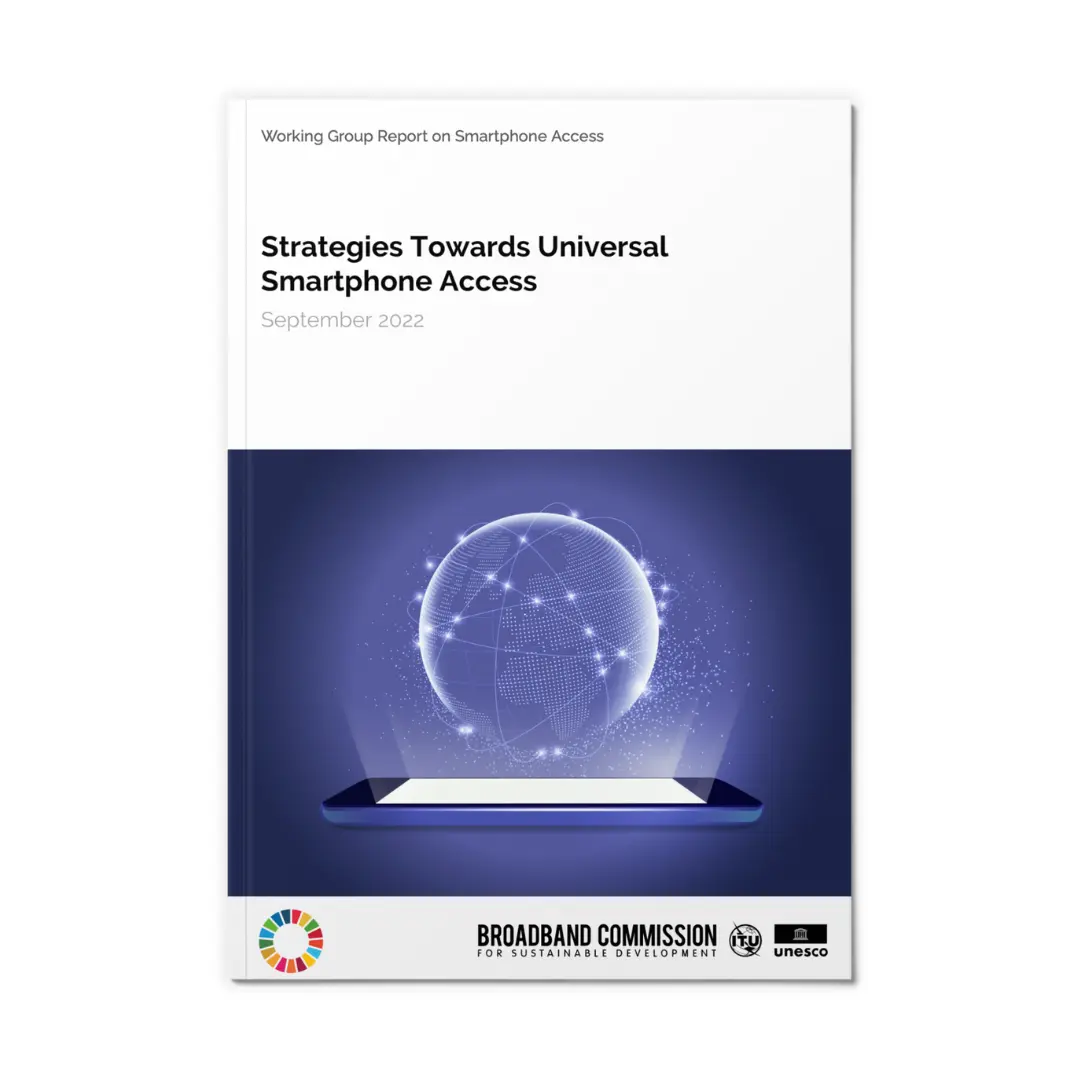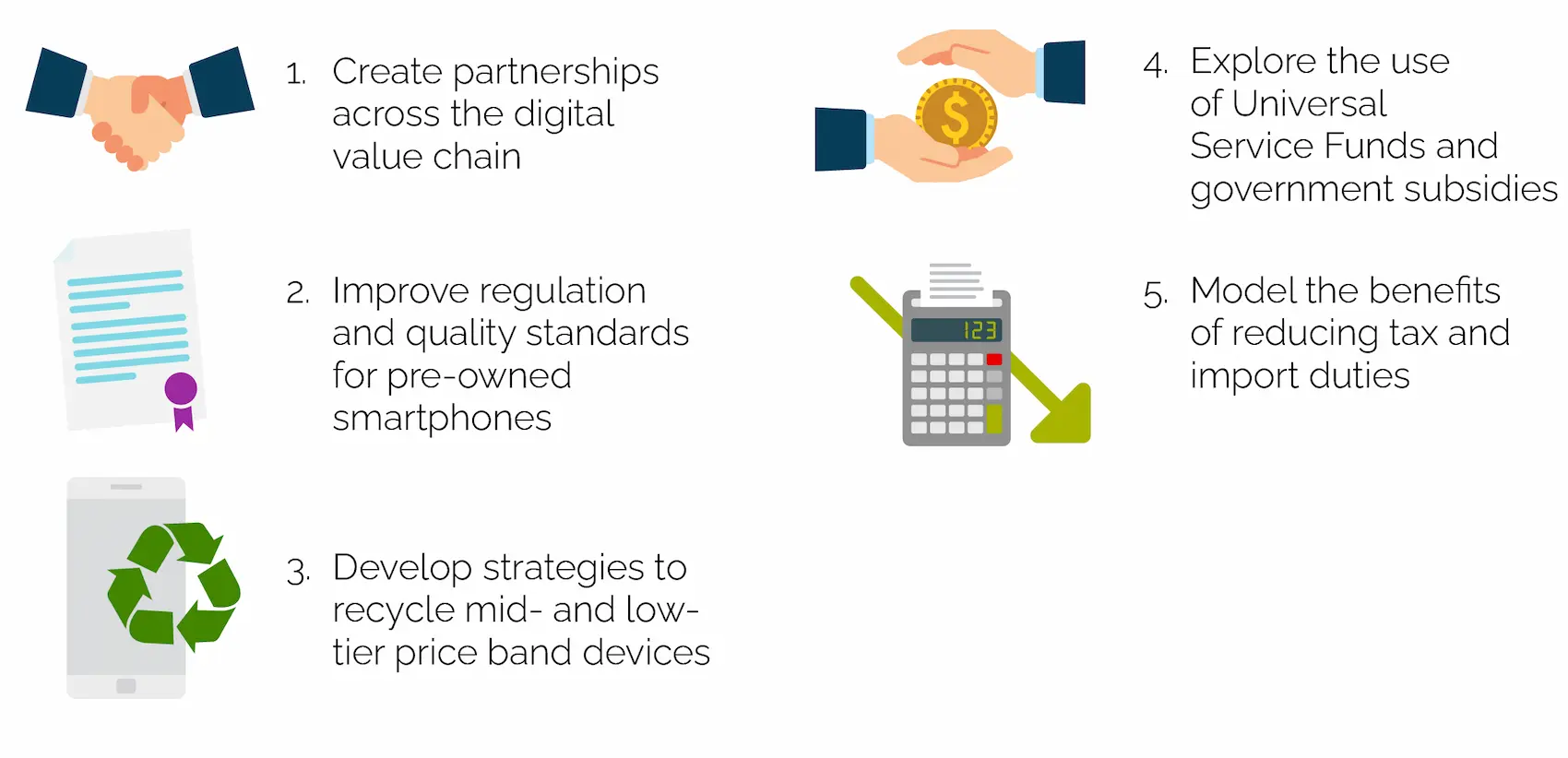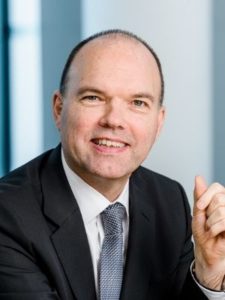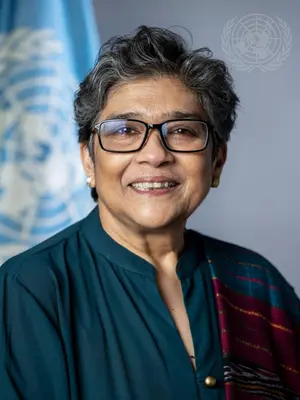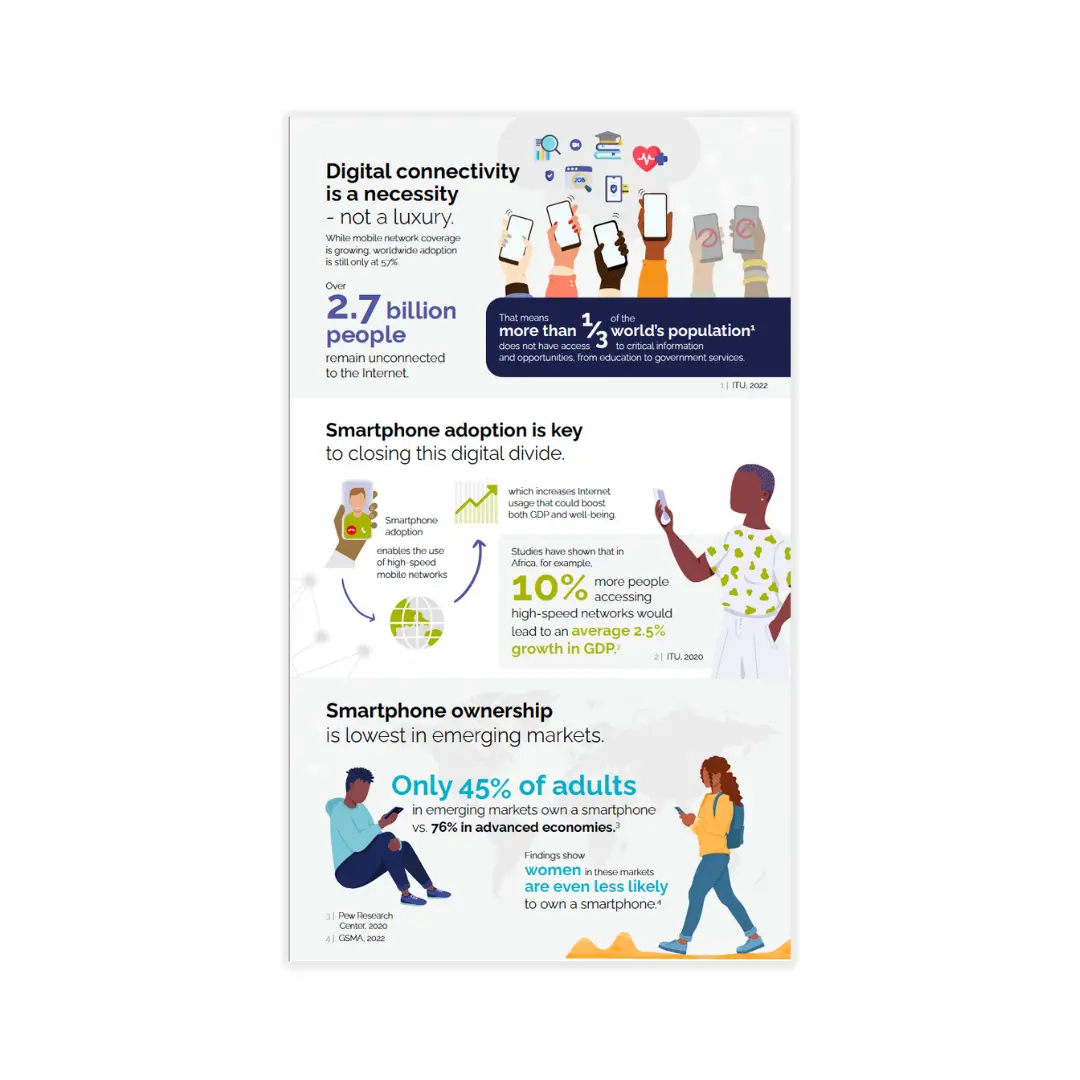How can we close the smartphone access gap and ensure greater digital inclusion?
Working Group Outcome Report
The Broadband Commission Working Group on Smartphone Access represents the first multi-stakeholder analysis to outline actionable recommendations to address smartphone access challenges.
The Working Group was co-chaired by Nick Read, CEO of Vodafone Group, Houlin Zhao, Secretary General of the ITU and Rabab Fatima, UN High Representative for the Least Developed Countries, Landlocked Developing Countries and Small Island Developing States (UN-OHRLLS) and drew upon the expertise of a cross sectoral body of Commissioners and experts. The outcome report, ‘Strategies towards universal smartphone access.’ delivers a five point action plan that aims to guide stakeholders in driving real progress in the area of smartphone access and tackling the digital divide.
Setting the Stage
Digital connectivity is a necessity, not a luxury.
Connectivity is an increasingly essential good in today’s digital society, enabling critical access to information, education and opportunity that contributes to economic growth. The COVID-19 pandemic has furthermore demonstrated the key role that internet access plays in the delivery of critical services such as agriculture, e-learning, health care, remote working, economic development, public services delivery, financial services, and disaster recovery.
Despite the progress that has been made to get more people online, nearly 2.7 billion people – around a third of the global population – still cannot or do not access the internet.
The majority of people that remain unconnected live in the least developed countries (LDCs), landlocked developing countries (LLDCs) and small island developing states (SIDS), which is exacerbating the digital divide in emerging markets and hindering countries from achieving their full socio-economic potential.
Around 97% of the world’s population now has access to a mobile data network but there is a disparity between connectivity and adoption. The adoption gap arises when individuals do not use the internet even when mobile network coverage exists; this is over seven times (43%) larger than the coverage gap (6%) globally.
Why do we need universal smartphone access?
Smartphone access improves quality of life. National studies have consistently shown a positive correlation between internet adoption and GDP, as well as socio-economic well-being in emerging markets. Transitioning users from 2G/3G to 4G/5G would yield even more improved benefits.
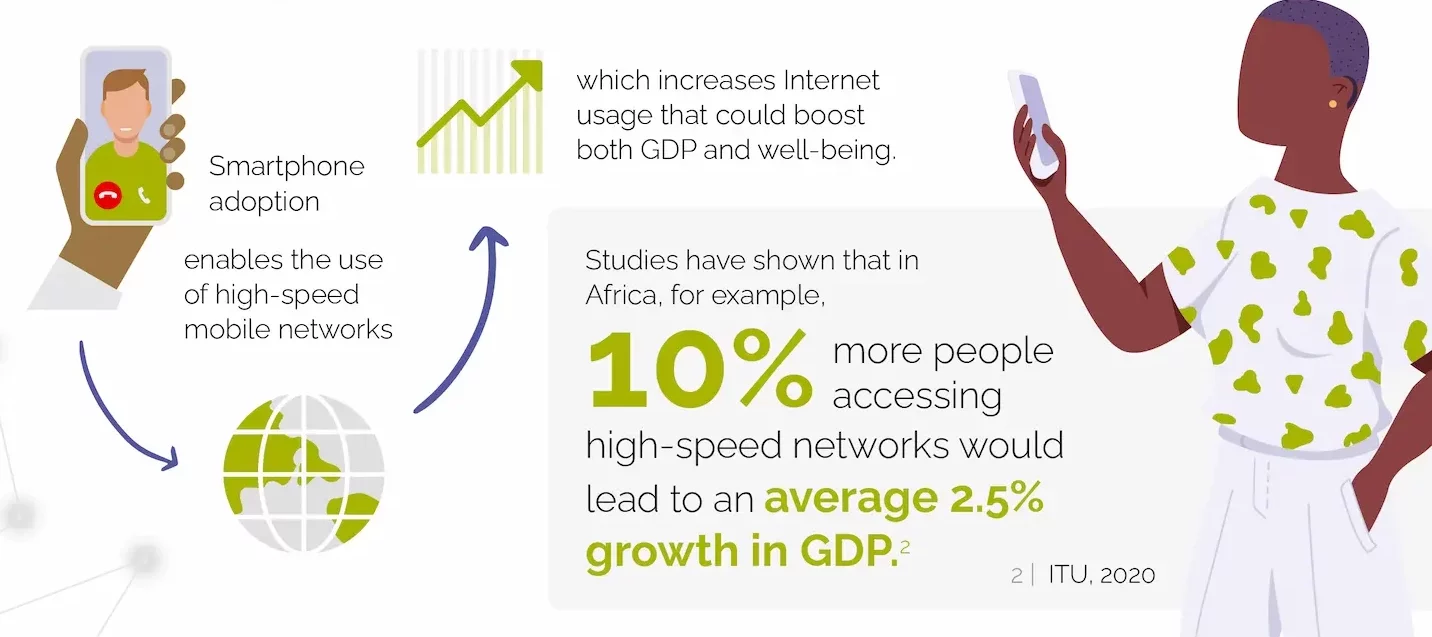
This impact is felt more acutely by women and those with a basic level of literacy. In households in which smartphones are withheld from female family members, the digital divide is another blow to gender equality.
Challenges to smartphone adoption
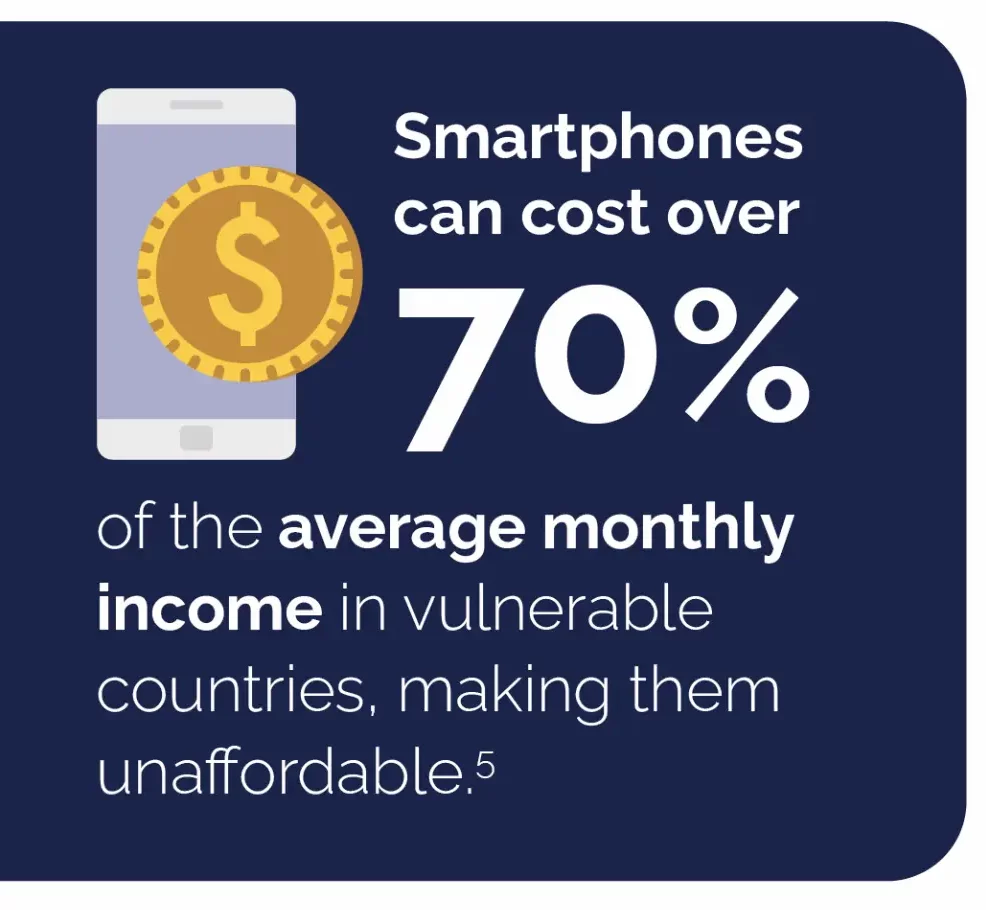
In terms of supply-side barriers, handset affordability was identified as the top reason for not obtaining a smartphone in emerging markets due to high retail costs, duties and taxes, data costs, charging costs and other logistical challenges.
Handset affordability affects women more than men and is cited as the top barrier precluding women from smartphone ownership.
On the demand side, a lack of consumer awareness, local incentives and basic digital skills erodes consumer confidence, limiting the adoption of smartphones. Available studies show that technical and financial literacy contribute to consumer confidence in owning and using smartphones in emerging markets and the lack of content in local language, with local context, presents another challenge to overcoming operative difficulties.
The Way Forward
Working Group Recommendations
The Working Group recommends three key interventions to make smartphones accessible to all
For those who cannot bear the lump sum outlay when purchasing a mobile phone, affordable loans with flexible payment options make smartphones more accessible. Recommendations include:
- allow customers to choose the frequency of their instalments to enable them to control their finances and increase confidence in loan repayments;
- design targeted financing for marginalised communities, such as women, people from remote locations, and low-income individuals;
- integrate device financing initiatives with mobile money to support customer repayment practices and provide potential financiers with creditworthiness data;
- use device lock technologies to reduce the cost of device financing; and
- take a holistic approach by increasing customer engagement with the financing service and guiding them through the whole process of acquiring and using a smartphone.
Different governments, especially in developing countries, have been imposing sector-specific taxes and import duties on smartphones that makes them inaccessible to many. Taxes on smartphones vary from country to country, and justifications for imposing import taxes on smartphones include stimulating local industry. However, some governments, especially in Africa, are levying taxes on smartphones in a way similar to luxury goods, resulting in excessively high final prices for devices. This also stimulates parallel (black) markets leading to a prevalence of poor quality devices. Recommendations include:
- design tax reforms to consider the benefits of mobile broadband penetration;
- set a long-term, balanced approach to taxation to meet domestic revenue collection objectives and provide a conducive environment for digital inclusion and economic development;
- examine the total cost and net impact of mobile ownership when designing tax reforms; and
- reduce taxes for devices below certain thresholds to incentivise smartphone manufacturers to cut prices to make their smartphones eligible for tax reduction/exemption.
For those living in remote or rural areas, there is often a lack of available handsets, skills training and retail outlets. Recommendations include:
- partner with local retail chains and community organisations with whom local customers already engage have high levels of trust;
- invest in training sales agents so they can effectively assist customers through the process of smartphone purchase and acquisition; and
- provide agents with sample handsets to help first-time and price-sensitive customers decide on smartphone purchases.
For those who cannot bear the lump sum outlay when purchasing a mobile phone, affordable loans with flexible payment options make smartphones more accessible. Recommendations include:
- allow customers to choose the frequency of their instalments to enable them to control their finances and increase confidence in loan repayments;
- design targeted financing for marginalised communities, such as women, people from remote locations, and low-income individuals;
- integrate device financing initiatives with mobile money to support customer repayment practices and provide potential financiers with creditworthiness data;
- use device lock technologies to reduce the cost of device financing; and
- take a holistic approach by increasing customer engagement with the financing service and guiding them through the whole process of acquiring and using a smartphone.
Different governments, especially in developing countries, have been imposing sector-specific taxes and import duties on smartphones that makes them inaccessible to many. Taxes on smartphones vary from country to country, and justifications for imposing import taxes on smartphones include stimulating local industry. However, some governments, especially in Africa, are levying taxes on smartphones in a way similar to luxury goods, resulting in excessively high final prices for devices. This also stimulates parallel (black) markets leading to a prevalence of poor quality devices. Recommendations include:
- design tax reforms to consider the benefits of mobile broadband penetration;
- set a long-term, balanced approach to taxation to meet domestic revenue collection objectives and provide a conducive environment for digital inclusion and economic development;
- examine the total cost and net impact of mobile ownership when designing tax reforms; and
- reduce taxes for devices below certain thresholds to incentivise smartphone manufacturers to cut prices to make their smartphones eligible for tax reduction/exemption.
For those living in remote or rural areas, there is often a lack of available handsets, skills training and retail outlets. Recommendations include:
- partner with local retail chains and community organisations with whom local customers already engage have high levels of trust;
- invest in training sales agents so they can effectively assist customers through the process of smartphone purchase and acquisition; and
- provide agents with sample handsets to help first-time and price-sensitive customers decide on smartphone purchases.
Other intervention areas that merit further exploration include device subsidies and the reuse of preowned devices.
The Working Group will create taskforces to complete a five-point action plan resulting from its findings
Download the report to learn more about these recommendations and how to implement them.
The Working Group Model
Composition and Activities
The Working Group included representatives from: America Móvil; the government of Benin; the Food and Agriculture Organisation of the UN; the government of Ghana; the GSMA; the International Trade Centre; Intelsat; the International Science Technology and Innovation Centre for South-South Cooperation; Millicom; Smart Africa; ZTE; and the World Wide Web Foundation.
The lead author of the report was Professor Christopher Yoo, John H. Chestnut Professor of Law, Communication, and Computer & Information Science at the University of Pennsylvania. The report has been informed by research from GSMA, ITU and 19 structured expert interviews, as well as insights from International Trade Centre (ITC) convened focus group of entrepreneurs and extensive desk research.
Prior to this report, efforts to address smartphone access challenges have been hindered by a lack of concrete information regarding their relative importance and the effectiveness of interventions to address them.
This study aims to evaluate their importance and make recommendations of priority actions – to drive real progress in the area of smartphone access and tackling the digital divide.
Mr. Nick Read
CEO of Vodafone

Mr. Houlin Zhao
Secretary General of the ITU
Ms. Rabab Fatima
High Representative of UN-OHRLLS
- Mr. Houlin Zhao, ITU
- Mr. Nick Read, Vodafone Group
- UN-OHRLLS
- Ms Audrey Azoulay and Borhene Chakroun, UNESCO
- Mr. Lacina Koné, Smart Africa
- Mr. Mats Granryd, GSMA
- H.E. Ursula Owusu-Ekufu, Ghana
- Dr. Carlos Jarque, America Movil
- H.E. Aurélie Adam-Soule Zoumarou, Benin
- Dato Lee Yee Cheong, UNESCO ISTIC
- Ms. Pamela Coke-Hamilton, ITC
- Dr. Qu Dongyu, FAO
- Mr. Mauricio Ramos, Millicom
- Mr. Ziyang Xu, ZTE
- Former Commissioner Mr. Adrian Lovett, World Wide Web Foundation
- Former Commissioner Mr. Stephen Spengler, Intelsat
- Intel
- University of Pennsylvania
- Softbank
- ARM
- Trustonic
- Pay Joy
- Transsion
- HMD/Nokia
- Mara Phones
- TCT
- AST
- World Bank Digital Development Global Practice
Focus Area
Outcome Resources
Co-Chairs
Mr. Nick Read
CEO of Vodafone
Mr. Houlin Zhao
Secretary General of the ITU
Ms. Rabab Fatima
High Representative, UN-OHRLLS
Broadband Advocacy Targets
SDGs

